I have never gotten over a story The New York Times ran in its Sunday magazine back in May 2016. Maybe you will remember the occasion. It was a lengthy profile of Ben Rhodes, the Obama administration’s chief adviser for “strategic communications.” It was written by a reporter named David Samuels.
These two made a striking pair — fitting, I would say. Rhodes was an aspiring fiction writer living in Brooklyn when, by the unlikeliest of turns, he found his way into the inner circle of the Obama White House. Samuels, a freelancer who usually covered popular culture celebrities, had long earlier succumbed to that unfortunately clever style commonly affected by those writing about rock stars and others of greater or lesser frivolity.
Rhodes’ job was to spin “some larger restructuring of the American narrative,” as Samuels put it. “Rhodes is a storyteller who uses a writer’s tools to advance an agenda that is packaged as politics.” A professional flack straight out of Edward Bernays, in plain English. A teller of tales trafficking in manipulable facts and happy endings. “Packaged as politics:” a nice touch conveying the commodification of our public discourse.
Rhodes and Ned Price, his deputy, were social-media acrobats. Price, a former C.I.A. analyst and now the State Department’s spokesman, recounted without inhibition how they fed White House correspondents, columnists, and others in positions to influence public opinion as a fois gras farmer feeds his geese.
Here is Price on the day-to-day of the exercise:
“There are sort of these force multipliers. We have our compadres. I will reach out to a couple of people, and, you know, I wouldn’t want to name them…. And I’ll give them some color, and the next thing I know, lots of these guys are in the dot-com publishing space and have huge followings, and they’ll be putting out this message on their own.”
Rhodes gave Samuels a more structured analysis of this arrangement:
“All the newspapers used to have foreign bureaus. Now they don’t. They call us to explain to them what is happening in Moscow or Cairo. Most of the outlets are reporting on world events from Washington. The average reporter we talk to is 27 years old, and their only reporting experience consists of being around political campaigns. That’s a sea change. They literally know nothing.”
I wrote at length about the Times piece in Salon, where I was foreign affairs columnist at the time. There was so much to unpack in Samuels’s report I hardly knew where to begin. In Price we had a complete failure to understand the role of properly functioning media and the nature of public space altogether.
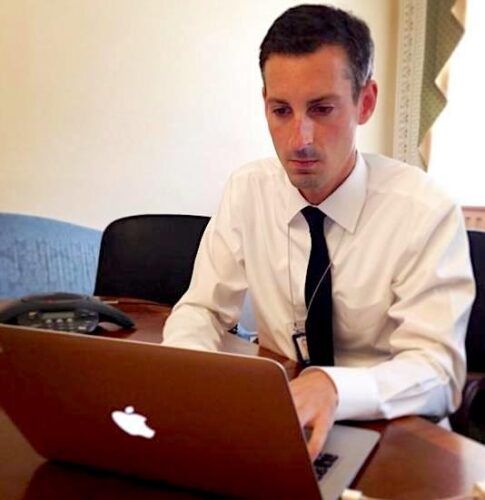
Price live blogging at the White House, Aug. 2014. (Kori Schulman/Obama Archives)
Rhodes described a White House press corps comprised of post-adolescents thoroughly dependent on the geese-feeding arrangement, especially when they reported on national security questions: “They literally know nothing.”
Rhodes and Price were describing some qualitative turn in the media’s relations with power. I do not mean to suggest these relations were ever in living memory very good, but at some point there had been a swoon, a giving way from bad to worse. “When you read routine press reports in the Times or any of the other major dailies,” I wrote of the Rhodes profile, “you are looking at what the clerks we still call reporters post on government bulletin boards, which we still call newspapers.”
When did this come about? Why had this come about? Was there yet worse to come? How did we get here, in other words, and where are we going? These were my questions. They are still my questions. I am moved to consider them again by the coverage of mainstream correspondents working in Ukraine. Among the many things we may want to call them, they are geese.
The New Yorker Once Upon a Time
My first inkling that something was changing in the way the American press looked out at the world and reported what its correspondents saw was close to home, a small-bore case — small bore, something large to think about in the telling of it. I was living in Japan at the time, the late 1980s through the mid–1990s. Apart from my duties for the International Herald Tribune, I was writing “Letter from Tokyo” for The New Yorker.
There was a long and honored tradition of “Letters from” at the time: Janet Flanner from Paris, Jane Kramer from all over Europe, Mollie Panter–Downes from London. Bob Shaplen, whose gave his career to Asia, was long The New Yorker’s “Far East correspondent” and wrote Letters from more or less every Asian capital. It was Shaplen, late in his career and his life, who handed off to me.
What distinguished The New Yorker’s foreign coverage, including all the Letters from, was the way it was produced. Those who wrote it were not only there: They had been there a long time, typically, and knew their various theres thoroughly, even intimately. They wrote not from the outside looking in, noses pressed against glass, but from within the places and among the people they were covering. You got the inside dope, as they used to say, when you read their pieces—the whispers in the palace, the chatter on the street. The stuff ran far deeper than anything you could read in the dailies.
My New Yorker was Bob Gottlieb’s New Yorker, Gottlieb having succeeded the famous William Shawn in the editor’s chair. Bob wanted to give the magazine an update while preserving its special character. Then Bob was ousted in favor of Tina Brown, who was obsessed with flash-and-dash and “buzz.” Everything had to have buzz. David Samuels could have profiled Tina: She was that sort. She ruined the magazine. She is long gone now, but The New Yorker has never recovered from Tina.
Tina’s editors accepted the Letters from Tokyo I filed after she took over, but none ever ran. In my next and last dealing with The New Yorker, a few years later, I proposed a profile of Shintaro Ishihara, the governor of Tokyo Prefecture, an accomplished sailor, and a fire-breathing nationalist full of anti–American bile. I liked Ishihara precisely for his bile, though when you interviewed him he stopped just short of pistol-whipping you.
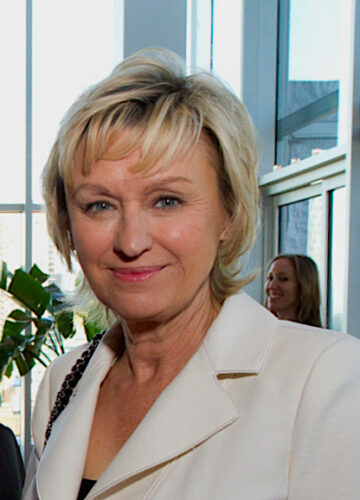
Tina Brown, April 2012. Financial Times/Wikimedia Commons
The New Yorker took no interest in the proposed piece. A few months later it ran a profile of none other than Shintaro Ishihara written by a reporter sent out from New York who, it was clear from his report, had but superficial knowledge of his topic or anything else to do with Japan.
My experience was soon evident in The New Yorker’s foreign coverage altogether. It no longer looked to correspondents who were long and well dug in overseas, but to people sent out for a story and then brought back. I describe a subtle turn, but it had profound implications. A magazine noted for its coverage of foreign places “from the inside out”—my phrase for it—decided it wanted reportage that put the American sensibility first. The outside in would more than do. I read this now as an early indication of a shift in America’s way of seeing others—or not.
As Seen From Washington
In 1995, as my final files to The New Yorker were going unpublished, Tom Friedman took over “Foreign Affairs,” a column with a long, I will not say hallowed history at The New York Times. Friedman’s arrival, with his bluster, his beer-belly prose, and his liberal jingoism, was another sign of the times. Big Tom writing in that space twice a week made it very clear that the practices of correspondents and commentators were changing—which, I can see now as I could not then, marked a change in the American consciousness.
I never much liked the Foreign Affairs column. Its relationship to power always seemed to me ethically questionable. It began in the late 1930s as “In Europe” and was ever after among the most sensitive assignments at the paper. C.L. Sulzberger, scion of the owners and a C.I.A.. collaborator during the Cold War, captured that patrician certainty the U.S. possessed during the first few postwar decades.
When she took over the column in the 1980s, Flora Lewis described a Continent restless within NATO’s confines and the American embrace. Here and there in the archives you can find columns that test the limits of the franchise. But you will never find one in which the limits are made visible.
Rereading such people, I am struck by certain things nonetheless. They had an appreciation for complexity and diversity — not just out in the wild dark beyond the Western alliance, but within it, too. However bad the work — and Cy Sulzberger’s columns collected clichés like barnacles on a sailboat’s bow — it derived from living and working abroad for many years. They display the confidence Americans felt amid the American Century. But rarely, if ever, were they triumphant or righteous. They didn’t have anything to prove.
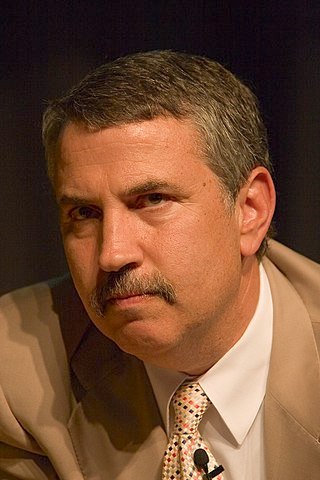
Thomas Friedman in 2005. Charles Haynes/Wikimedia Commons
The first thing Friedman did when he inherited the Foreign Affairs space on the opinion page was move the column to Washington — no more living among others. The second thing he did was stop listening to others apart from a few friends and acquaintances. In The Lexus and the Olive Tree, his execrable hymn to neoliberal globalization as led by the U.S., he described himself as a “tourist with attitude.” Tom had it in one. As he explained in that 1999 book, his favorite sources were bond traders and hedge fund managers.
“In today’s global village, people know there is another way to live, they know about the American lifestyle, and many of them want as big a slice of it as they can get—with all the toppings. Some go to Disney World to get it, and some go to Kentucky Fried in northern Malaysia.” This was Big Tom in the Foreign Affairs chair. This is the degeneration of American comment on the world beyond our shores—in “real time,” let’s say.
The Foreign Affairs column is now gone altogether, I should add. The Times killed it years ago. Why would anyone want to read a column with a name like that, after all?
If my topic is a gradual lapse in the professional practices of American journalists, a gradual indifference to “being there,” we cannot think about this on its own. Their delinquencies are to be understood as symptoms of a larger indifference among us toward the world that has taken hold since, I will say, Germans dismantled the Berlin Wall and the U.S. entered its memorably awful decades of triumphalism. Gradually since then, it has mattered less and less what other people think or do or what their aspirations might be. The only way to see things is the American way.
The cases I have described are early signs of this turn for the worse. But if they are symptoms, they are also causes. It is possible to be both, after all. This is the power of media when put to perverse purpose. Many of us have become progressively indifferent to others since the 1990s, and this is in large part because our print and broadcast media have shown us how.
9/11’s Hit on Journalism
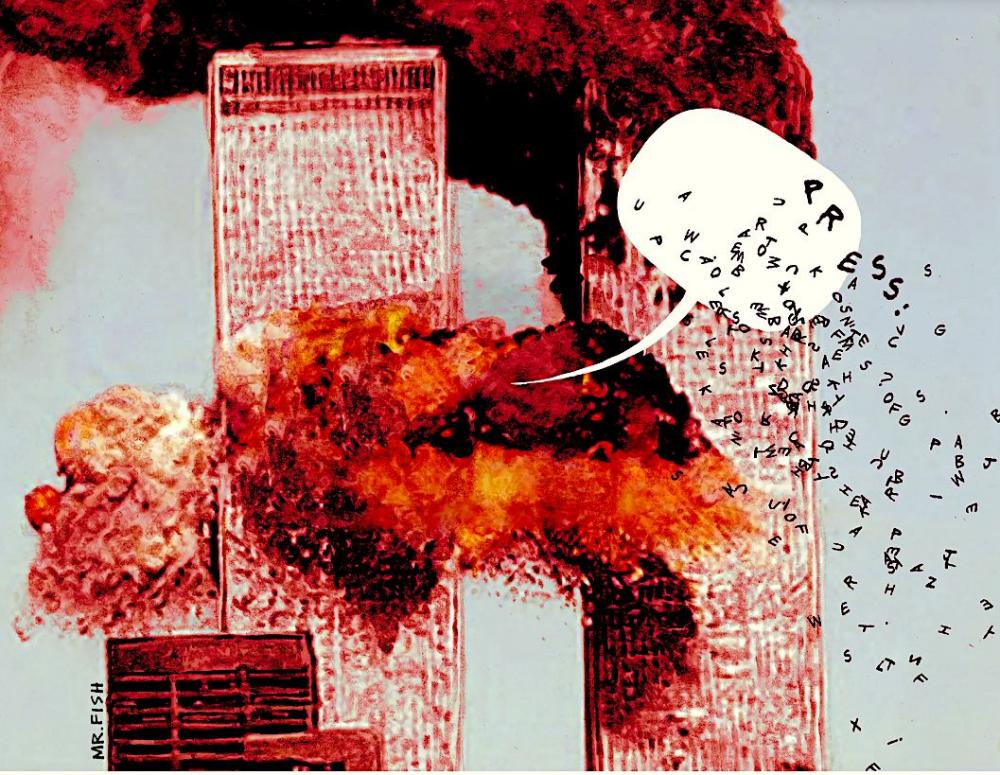
Speechless. (Mr. Fish)
The events of Sept. 11, 2001, changed things again—in the practices of our media, in the Zeitgeist altogether. Fifteen years on from those tragedies, Ben Rhodes and Ned Price were feeding their geese. Six years on from that, we are getting the worst press coverage of overseas events I can remember from the correspondents fielded in Ukraine.
A few days after the attacks on the World Trade Center and the Pentagon on Sept. 11, 2001, George W. Bush’s press secretary arranged a conference call with America’s leading editors in Washington. Ari Fleischer’s intent was to secure the cooperation of newspapers and broadcasters as the administration defined and prosecuted its new “war on terror.” He asked those on the line to black out coverage that revealed how America would wage this war. Fleischer was especially eager to keep from public view the operations of the C.I.A. and the rest of the national security apparatus. All present that day readily obliged the Bush administration in these matters.
Some years later, Jill Abramson, The New York Times’s Washington bureau chief at the time of the Fleischer call, gave us what seems the only extant account of the exchange. “The purpose of the call was to make an agreement with the press — this was just days after 9/11—that we not publish any stories that would go into details about the sources and methods of our intelligence programs,” Abramson explained in a lengthy lecture in 2014 at the Chautauqua Institution, a convocation of well-intended self-improvers in western New York. “It wasn’t complicated to withhold such information. And for some years, really quite a few years, I don’t think the press, in general, did publish any stories that upset the Bush White House or seemed to breach that agreement.”
I marvel when I consider what we now know of “such information.” It included C.I.A. kidnappings, which the government later termed “extraordinary renditions” so as to obscure the truth of what it did, along with its use of “black sites” where uncharged detainees were subject to waterboarding and other forms of sadistic torture. “Such information,” it later turned out, also included the National Security Agency’s indiscriminate surveillance of Americans and whichever non–Americans it chose.
I marvel because had the press’s most influential editors determined to tell Ari Fleischer where to get off, just as they should have and in just such terms, these things may not have occurred, and the American government and American media might have emerged from the Sept. 11 events as more honorable institutions.
When a White House press secretary considers it proper to convene such a gathering and ask those present to participate in the censorship of their own publications, it is plain that media’s relationship to power—in this case political and administrative power—was already compromised. The editors to whom Fleischer appealed soon after accepted the term “war on terror” with no recorded hesitation or objection. This was another breach of professional ethics with far-reaching consequences, given that a state of war inevitably alters the media’s relations with power.
I count these in-unison responses as a defining moment in the decline of American media and their coverage of foreign affairs during the post–2001 years. To understand this, it is necessary briefly to consider what happened to America and Americans altogether on that late-summer morning in Lower Manhattan and in Washington.
Sept. 11 marked the uncannily abrupt end of “the American Century” and—not to be missed—the consciousness it engendered among Americans. I have made this point in this space and elsewhere on previous occasions. There was, in short, a psychological collapse vastly more consequential than the collapse of the towers, sorrowful as the 3,000 fatalities were.
America’s policy elites assumed a defensive crouch that day. They turned away from the world and against it all at once. The Bush administration was openly xenophobic with all its talk of “Islamofascism” and other such ridiculous notions. Most Americans turned in the same way. When Jacques Chirac refused to enlist France in Bush’s “coalition of the willing” against Iraq, the French became “cheese-eating surrender monkeys,” a phrase I have always liked for its hardy American jingoism. Remember “Freedom Fries?”
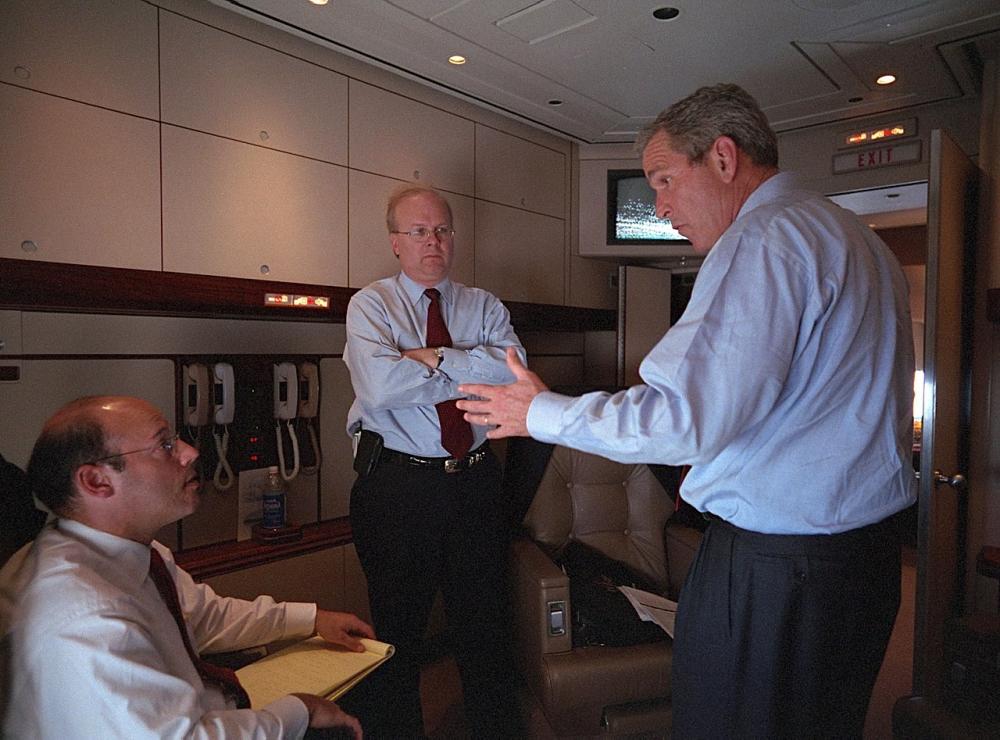
George W. Bush speaks with Ari Fleischer, left, and Karl Rove aboard Air Force One Tuesday, Sept. 11, 2001, during the flight from Offutt Air Force Base in Nebraska to Andrews Air Force Base. (Eric Draper, Courtesy of the George W. Bush Presidential Library)
From the World to Against It
This hostility toward others has lurked in the American mind since the 17th century, breaking the surface all too frequently. The Irish in the 19th century were ignorant, the Italians greasy, and the Chinese yellow and a peril. Sept. 11 plunged America into this sewer once again. For a time it was perfectly fine to refer to Muslims as “ragheads.”
This shift, away from the world and against it, is regrettable enough as a matter of the national posture. But it has been especially fateful in leading the coverage of overseas events in our major dailies and broadcasters straight down the chute. As we have it, this coverage has become the worst in my fairly long lifetime, but a note of caution on this point: I have called American media’s coverage of foreign affairs the worst in my lifetime on numerous occasions in the past only to find its deterioration deepens inexorably and sometimes by the day.
Why is this? Why do I settle on Sept. 11, 2001, as the point of departure?
Jill Abramson went on to serve as The Times’s executive editor. Although that interim ended when she was fired after two and a half years, she was a journalist of very high stature, if not of high caliber. Here is what she said when she explained to her Chautauqua audience the reasons the American press caved so cravenly to Ari Fleischer’s objectionable demands. “Journalists are Americans, too. I consider myself, like I’m sure many of you do, to be a patriot.”
These two sentences flabbergast me every time I think of them. For one thing, they are an almost verbatim repeat of what scores of publishers, editors, columnists, correspondents, and reporters said after Carl Bernstein, in the Oct. 20, 1977, edition of Rolling Stone, exposed more than 400 of them as C.I.A. collaborators. Joe Alsop, columnist at the New York Herald Tribune and later The Washington Post and a Cold Warrior par excellence: “I’ve done things for them when I thought they were the right thing to do. I call it doing my duty as a citizen.”
Does nothing ever change? Do people such as Abramson ever learn anything?
For another, from Alsop’s time to Abramson’s and ours, it does not seem to occur to these people that for an editor or reporter to be a good American requires only that he or she be a good editor or reporter. Instead, they reason that in times of crisis it is somehow necessary that the media betray their fundamental principles — as if these are at bottom expendable.
“What happened no longer mattered. Balanced sourcing no longer mattered. Accuracy no longer mattered. The work of witnessing no longer mattered. Conformity mattered.”
Final point here: American media’s gravest error during the Cold War, the progenitor of all others, was their willing enlistment in the cause of the new national security state. This is what Alsop was talking about. It was accomplished by, I would say, 1948 or 1949 at the latest: In other words, the press and broadcasters climbed on the Truman administration’s newly declared crusade more or less immediately.
And this is also what Jill Abramson was talking about out in the wilds of Chautauqua 65 years later. And that is what American media did immediately after Sept. 11: They enlisted once again in the national security state’s new cause.
By Abramson’s time, America had consolidated a global empire that was merely nascent when Joe Alsop and his brother, Stewart, were writing. The distinction is important. Long before any of this, Rudolf Rocker, one of those true-blue anarchists the late 19th century produced, published Nationalism and Culture. This book — hard to find now and expensive when you do — reminds us: As an empire gathers and guards its power, all institutions of culture are required in one or another way to serve it. None that do not can survive. Rocker used “culture” very broadly. In his meaning of the term, a given nation’s media are cultural institutions, and the bitter truth he articulated applies.
After Sept. 11, at first subtly and then not so, one administration after another insisted that there is only one way to understand the world — the American way — and there is no need to understand or consult as to anyone else’s. I am tempted to invite readers to finish this paragraph, but this seems impolite. So: This way of thinking, or refusing any longer to think, is essentially defensive, the refuge of the anxious and uncertain. And if it has not defined the downward spiral in the quality of mainstream media’s post–2001 foreign coverage, this is a very close call.
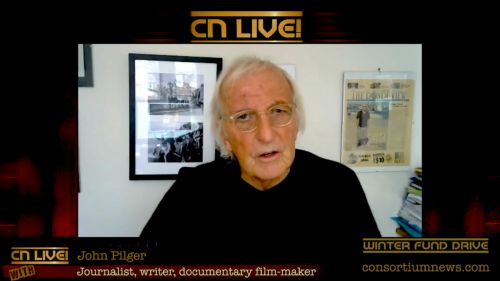
John Pilger, the Australian–British correspondent and filmmaker, remarked after the U.S. cultivated the 2014 coup in Kyiv, “The suppression of the truth about Ukraine is one of the most complete news blackouts I can remember.” Hear, hear, although I imagine John can think of more “most complete” blackouts now, eight years on.
Those readers and viewers who confined their sources of information to the mainstream got some impossibly black-hats, white-hats version of events in Ukraine after the February 2104 coup — which was not a coup but a “democratic revolution.” This was just as the policy cliques in Washington wanted it.
The U.S. role in the putsch, the presence of neo–Nazis among the putschists, the antidemocratic character of a duly elected president’s overthrow, the new regime’s subsequent bombardment of civilians in the eastern provinces — an eight-year campaign — the wholesale discrimination since against Russian speakers and critical media, the assassinations of opposition political figures, Washington’s use of Ukraine in its longtime drive to subvert Russian— all of this was left out.
By the time the crisis in Ukraine erupted, the war in Syria had been on for more than two years. I am not calling this a civil war because it wasn’t one. The U.S. tipped what began as legitimate demonstrations against the Damascus government in late 2011 into an armed conflict by early 2012 at the latest. It was roughly then that Jake Sullivan, Hillary Clinton’s adviser at the time, memoed the secretary of state: Good news, we’ve got al–Qaeda on our side in Syria.
Imagine Being There

A Turkish-backed Free Syrian Army fighter loads an M2 Browning during the fighting in northern Aleppo Governor-ate, November 2016. (Mada Media, Wikimedia Commons)
Of the barely covert coup operation, of the arming of jihadist fanatics against the secular Assad government, of the savage murders, kidnappings, and torture the C.I.A. effectively financed: No, of the true nature of this war we read nothing unless we resorted to the few independent journalists principled enough to report from Syrian soil. Imagine that: Being there.
How the Western print media and networks reported the Syrian crisis has seemed to me — I keep resorting to this — among the worst cases of dereliction in my lifetime. Western correspondents remained in Beirut or Istanbul and got their information through sources on the ground in Syria via telephone, Skype, or social media.
And who were these sources? Opposition figures or the Syrian staff of Western nongovernmental organizations, by and large anti–Assad sources to a one. But never mind that: This stuff went into the reporting as objective. The admirable Patrick Cockburn laid all this out years ago in a very fine piece in The London Review of Books, back when the LRB published such things.
And where did these correspondents turn when they needed a pithy analytic quotation? To American scholars, think tank inhabitants, and government officials in Washington. This practice, I should add, is in no wise limited to the Syria coverage. With a Beirut or a Beijing dateline, American correspondents now think nothing of quoting Americans and then reading back to America what Americans think of this or that foreign affairs question.
These inexcusable practices were across the board in Syria. I will name two names because I think naming names in these kinds of cases is important. Ben Hubbard and Ann Barnard, both of The New York Times, were among the worst offenders. They led the pack as they referred incessantly to murderous jihadists as “moderate rebels,” that now-infamous phrase. It was in large part because these moderate rebels would behead them were they to report from Syria that Hubbard, Barnard et al rarely set foot in the country, if they ever did, to cover the war they purported to cover.
By this time, it was very clear: What began with Ari Flesicher’s conference call was now a consolidated process. No foreign correspondent whose accounts of events did not match quite precisely the Washington orthodoxy could report for mainstream media. What happened no longer mattered. Balanced sourcing no longer mattered. Accuracy no longer mattered. The work of witnessing no longer mattered. Conformity mattered. Those doing principled work in the independent press, the work of bearing witness, now as then, are routinely vilified.
Parenthetically, I see that I have once again asserted the importance of independent media in our time. This cannot be underscored too often. I happen to think American media have a bright future, miserable as its present prospects may appear. It will not be easily or quickly won, but this future lies with independent publications such as this one.
How far was it from the bureaus in Beirut to Ben Rhodes’ office in the Obama White House? A hop-skip, I would say. With Rhodes as Obama’s “communications strategist, and Ned Price his deputy spinner in chief, the correspondents covering Syria could have done the exact same job were they among the “compadres” Price spoke of in 2016—Washington journalists who reported on foreign events after he fed them like geese. This same is true of the correspondents now covering the Ukraine crisis.
With one difference: It remains only to maintain the appearance that one is working as a foreign correspondent — the heroic pose. Reenactment seems to be the point now. Other than this and with a few exceptions, they have all come home — incuriously, lethargically home, one gets the impression with neither inspiration nor guts, resigned to the new routine.
Listen to Chris Hedges and Patrick Lawrence discuss this article:
Patrick Lawrence, a correspondent abroad for many years, chiefly for the International Herald Tribune, is a columnist, essayist, author and lecturer. His most recent book is Time No Longer: Americans After the American Century. His Twitter account, @thefloutist, has been permanently censored. His web site is Patrick Lawrence. Support his work via his Patreon site. His web site is Patrick Lawrence. Support his work via his Patreon site.
The views expressed are solely those of the author and may or may not reflect those of Consortium News.
From the Late Founder and Editor Robert Parry: When we founded Consortium News in 1995 – as the first investigative news magazine based on the Internet – there was already a crisis building in the U.S. news media. The mainstream media was falling into a pattern of groupthink on issue after issue, often ignoring important factual information because it didn’t fit with what all the Important People knew to be true.
Indeed, that was the original reason that I turned to what was then a new media platform to create a home for well-reported stories and to challenge the many misguided conventional wisdoms.
PayPal, a British government official, and now NewsGuard have all targeted Consortium News this year for challenging official narratives. Help us to fight back.


Spread the word